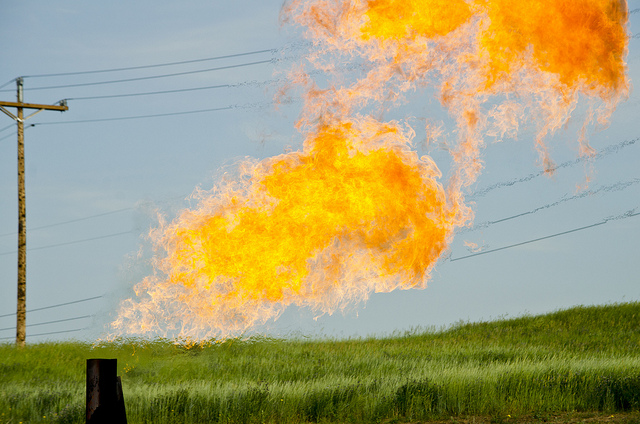 Flickr User: Tim Evanson
Flickr User: Tim Evanson
Methane Regulation Key to Global Methane Assessment
The Global Methane Assessment is a stark reminder of the importance of reinstating methane regulations in the United States. The report, released May 6th, outlines both the dangers of unabated methane leakage and methods for reducing methane emissions by 45% by 2030—which would reduce potential warming by 0.3° C through the 2040s. Though the totality of methane emissions are lower than CO2 and it lasts a shorter time in the atmosphere, pound for pound methane is a much more powerful pollutant. It will be impossible to meet the 1.5° C goal without a significant decrease in methane emissions.
The report finds that methane contributions in the United States are primarily from the fossil fuel industry, and measures for reducing 98% of leakage from coal plants and 80% of leakage from oil and gas could be implemented at low or negative costs. Retained methane, after all, can be sold. Methane leakage not only contributes significantly to warming, but the report finds that a reduction by 45% would annually prevent over 250,000 premature deaths and 26 million tons of crop losses across the globe.
Reinstating the previous regulations on methane in the United States is crucial to meeting these goals. On 29 April, 2021 a bipartisan majority of the Senate, with support from major oil and gas companies like BP, Shell, Cheniere, and Occidental, voted to reverse Trump Administration rollbacks of methane regulations. A House vote should follow in short order. The original rollback, completed in 2020, was done against the wishes of major oil and gas corporations, who recognize that without emissions regulations, LNG cannot be said to be cleaner than coal.
The American Security Project has argued for years that methane regulations are a crucial bulwark against harmful emissions. Leaders like Sen. Collins and Graham are again working to reimpose regulations ASP supported as common sense measures in 2016. LNG can act as a bridge fuel, but only with proper restrictions in place.
The newly released Tennessee Valley Authority Strategic Intent and Guiding Principles is a perfect example. The TVA lays out a plan to become a net-zero provider by 2050 by using LNG as a bridge fuel. LNG will enable the closure of coal plants by 2035 and enable expanded solar capacity. In order to fully realize the potential of this transition, however, it must be done under appropriate and responsible regulation.
We know that climate change presents real challenges to national security. America’s military, and militaries around the world are taking the climate threat seriously. Climate change is harming global security through its impacts on resource scarcity, extreme weather, food supplies, water availability, and sea level rise. Because of this imminent threat, we need action now. The United States must be a leader in methane capture technology and regulation, reinstating methane regulations is imperative.





